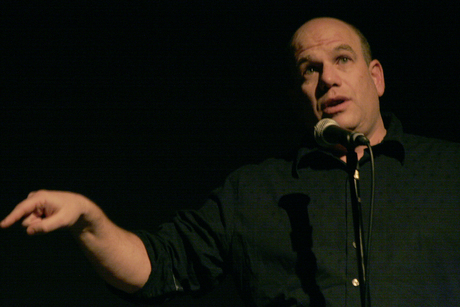David Simon (Stoop Storytelling Series, 4/5/2007)
My Nemesis: Stories About the Enemies, Bullies, and Brawls That Have Shaped Us
“It’s an evening of black eyes, wounded hearts, and long-held grudges when seven storytellers get seven minutes each to tell tales of anger, resentment—and maybe forgiveness.” —Stoop Storytelling Series
* * *
What The Wire Reveals About Urban Journalism
By Lawrence Lanahan
“…He doesn’t always deliver that criticism with a light touch. In April, a friend of mine was scheduled to participate in a storytelling series called “The Stoop” at a Baltimore arts organization called Creative Alliance, and it turned out that Simon was on the bill, too, so I went. The theme was “My Nemesis,” and after six fantastic tales, Simon stepped to the stage in an untucked black shirt and jeans. “My nemesis,” Simon said graciously, “is whoever asked me to follow that up.” Simon then set up his own story. He described himself as a grudge-holder nonpareil, motivated only by an egotistical need to prove to people that they were wrong and he was right. “So naturally,” he said, “the place I needed to be was in journalism.” He was happy at the Sun, he told the full house, but then Marimow and Carroll came along.
Simon slammed their vision of journalism. He trashed the work they were most proud of, mocked their social graces, and dropped on them a generous payload of f-bombs. “Whenever they hear the word ‘Pulitzer,’ they become tumescent,” he said. Naming a nasty fourth season Wire character “Marimow” wasn’t enough, so Simon cast one-dimensional caricatures of Carroll and Marimow for the fifth season just to put a finger in their eyes.
The twist in the story, in Simon’s telling, is that when he heard about Carroll’s heroic stand at the Los Angeles Times and about Marimow’s recent bout with prostate cancer, he felt bad. And then, when his actors started filling out the characters as real, complex human beings, he realized his own smallness and pettiness. Good storytelling dictated that the season would have to fully develop the characters and confront the bigger issues currently facing journalism, not just irritate his old “asshole bosses.””
Continue reading “What The Wire Reveals About Urban Journalism” at http://kurtrudder.blogspot.com.

